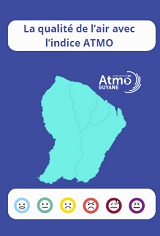Blada.com
dimanche 01 mars
Boîtes aux lettres
Courrier des lecteurs
Petites annonces
Emploi / Formation
Covoiturage
Infos citoyennes
Infos citoyennes
08/06/21
Journée Mondiale des Océans : de la connaissance à l’action

A l’occasion de la journée mondiale des océans, l’Initiative française pour les récifs coralliens (IFRECOR), co-présidée par les ministères de la Transition écologique et des Outre-mer, publie un bilan de l’état de santé des récifs coralliens, herbiers marins et mangroves des outre-mer français en 2020.
Les récifs coralliens couvrent moins de 1 % de la surface des océans mais hébergent plus de 25% de la vie marine et génèrent des services pour de nombreux Etats insulaires. Dans les outre-mer français on estime qu’ils contribuent à hauteur de 1,3 milliards d’euros aux économies de neuf collectivités d’outre-mer (selon Pascal, 2016).
Pourtant la dernière évaluation de la biodiversité mondiale réalisée en 2019 par la Plateforme intergouvernementale scientifique et politique sur la biodiversité et les services écosystémiques (IPBES) indique que le couvert corallien vivant a diminué de près de 50% depuis 1870, que ce déclin s'accélère et que les écosystèmes coralliens sont menacés d'effondrement d'ici 2050, soulignant la nécessité accrue d'une action urgente pour remédier à ce déclin.
Avec 10% de la surface de récifs dans les trois océans Atlantique, Indien et Pacifique, la France est le 4ème pays corallien au monde grâce aux territoires ultra-marins. Elle a par conséquent une responsabilité particulière et un rôle important à jouer dans leur préservation.
Ce bilan publié aujourd’hui s’appuie sur 20 ans de surveillance des écosystèmes, et présente un instantané de leur état de santé :
· 70% des récifs coralliens suivis sont en bonne santé dans les territoires du Pacifique (Nouvelle-Calédonie, Polynésie française, Wallis-et-Futuna) et dans les Îles Eparses de l’Océan Indien.
· Dans les territoires plus densément peuplés des Antilles françaises (Guadeloupe, Martinique, Saint-Barthélemy, Saint-Martin) et de l’Océan Indien (Mayotte, La Réunion) 62% sont dégradés.
Par ailleurs, le rapport dresse les tendances de long terme sur l’évolution de ces écosystèmes, qui confirment les prévisions des experts internationaux sur le climat et la biodiversité avec un déclin global des récifs, mangroves et herbiers.
Le ministère de la transition écologique est pleinement mobilisé aux côtés du ministère des Outre-mer, et avec l’IFRECOR dans la mise en œuvre du Plan d’actions pour la protection des récifs coralliens des outre-mer français. Ce plan national a pour objectif de protéger 100% des récifs coralliens d’ici à 2025. Il s’appuie notamment sur la mobilisation citoyenne, à travers la plateforme SOS Corail, ouverte fin 2020, qui vise à financer des projets en faveur des coraux, mangroves et herbiers. Le ministère de la Transition écologique et le ministère des Outre-mer soutiennent le lancement de la plateforme SOS Corail, issue d’un partenariat entre l’IFRECOR et la Fondation de la Mer, qui permet au grand public et aux acteurs privés de s’engager pour la préservation des écosystèmes. Les deux ministères doubleront chaque don réalisé sur la plateforme, pour faire une priorité de la protection de nos récifs.
« La plateforme SOS Corail permet désormais au grand public et aux acteurs privés de s’engager concrètement pour la préservation des écosystèmes, en particulier en outre-mer. Les récifs coraliens font la richesse environnementale de nos territoires ultramarins, mais contribuent également à leur dynamisme économique » annonce Sébastien Lecornu, ministre des Outre-mer.
« Les récifs coralliens feront partie des écosystèmes emblématiques mis à l’honneur dans la stratégie nationale biodiversité en cours d’élaboration et j’y suis particulièrement attachée. Leur protection fait partie des défis pour nombre de collectivités ultra-marines, tant pour leur biodiversité que l’importance économique ou culturelle qu’ils revêtent » précise Bérangère Abba, secrétaire d’Etat en charge de la biodiversité.
SOS Corail : https://www.soscorail.org/
Bilan de l’état de santé des récifs coralliens, herbiers marins et mangroves des outre-mer français en 2020 : https://ifrecor.fr/2021/06/08/2020-letat-de-sante-des-recifs-coralliens-herbiers-marins-et-mangroves-des-outre-mer-francais-un-bilan-mitige/
On the occasion of World Oceans Day, the French Initiative for Coral Reefs (IFRECOR), co-chaired by the Ministries of Ecological Transition and Overseas Territories, publishes a report on the state of health of the reefs. corals, seagrass beds and mangroves in French overseas territories in 2020.
Coral reefs cover less than 1% of the ocean surface but are home to more than 25% of marine life and generate services for many island states. In the French overseas territories, it is estimated that they contribute 1.3 billion euros to the economies of nine overseas communities (according to Pascal, 2016).
Yet the latest assessment of global biodiversity carried out in 2019 by the Intergovernmental Scientific and Policy Platform on Biodiversity and Ecosystem Services (IPBES) indicates that living coral cover has decreased by nearly 50% since 1870, that this decline is accelerating. and that coral ecosystems are at risk of collapse by 2050, underscoring the increased need for urgent action to address this decline.
With 10% of the surface of reefs in the three oceans Atlantic, Indian and Pacific, France is the 4th coral country in the world thanks to the ultra-marine territories. It therefore has a special responsibility and an important role to play in their preservation.
This report published today is based on 20 years of monitoring ecosystems, and provides a snapshot of their state of health:
· 70% of the coral reefs monitored are in good health in the Pacific territories (New Caledonia, French Polynesia, Wallis and Futuna) and in the Scattered Islands of the Indian Ocean.
· In the more densely populated territories of the French Antilles (Guadeloupe, Martinique, Saint-Barthélemy, Saint-Martin) and the Indian Ocean (Mayotte, Reunion) 62% are degraded.
In addition, the report draws up long-term trends in the evolution of these ecosystems, which confirm the predictions of international experts on climate and biodiversity with an overall decline in reefs, mangroves and seagrass beds.
The Ministry of Ecological Transition is fully mobilized alongside the Ministry of Overseas Territories, and with IFRECOR in the implementation of the Action Plan for the Protection of Coral Reefs in French Overseas Territories. This national plan aims to protect 100% of coral reefs by 2025. It relies in particular on citizen mobilization, through the SOS Corail platform, opened at the end of 2020, which aims to finance projects in favor of corals. , mangroves and seagrass beds. The French Ministry of Ecological Transition and the French Overseas Ministry are supporting the launch of the SOS Corail platform, resulting from a partnership between IFRECOR and the Fondation de la Mer, which allows the general public and private stakeholders to commit to the preservation of ecosystems. The two ministries will double each donation made on the platform, to make the protection of our reefs a priority.
"The SOS Corail platform now allows the general public and private stakeholders to make a concrete commitment to the preservation of ecosystems, in particular overseas. Coral reefs are the environmental richness of our overseas territories, but also contribute to their economic dynamism, ” announces Sébastien Lecornu, Minister of Overseas Territories.
"Coral reefs will be one of the emblematic ecosystems honored in the national biodiversity strategy being developed and I am particularly attached to them. Protecting them is one of the challenges for many ultra-marine communities, both for their biodiversity and for their economic or cultural importance, "said Bérangère Abba, Secretary of State in charge of biodiversity.
SOS Corail: https://www.soscorail.org/
Assessment of the state of health of coral reefs, seagrass beds and mangroves in French overseas territories in 2020: https://ifrecor.fr/2021/06/08/2020-letat-de-sante-des-recifs-coralliens-herbiers-marins-et-mangroves-des-outre-mer-francais-un-bilan-mitige/
Raccourcis


passer une petite annonce

passer une annonce de covoiturage


passer une annonce d’emploi







associations, postez vos actualités

participez au courrier des lecteurs
La Guyane c’est ici
La qualité de l’Air avec
ATMO
Photothèque

Lancements 2022
Vol 259 Ariane 5




